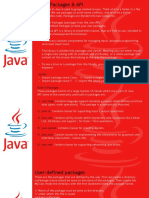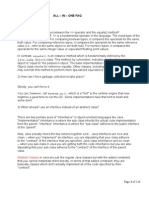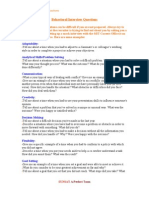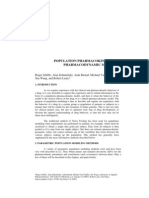Javaq
Uploaded by
api-26189934Javaq
Uploaded by
api-26189934Question : When you declare a method as abstract method ?
Answer : When i want child class to implement the behavior of the method.
Question : Can I call a abstract method from a non abstract method ?
Answer : Yes, We can call a abstract method from a Non abstract method in a Java abstract
class
Question : What is the difference between an Abstract class and Interface in Java ? or
can you explain when you use Abstract classes ?
Answer : Abstract classes let you define some behaviors; they force your subclasses to
provide others. These abstract classes will provide the basic funcationality of your
applicatoin, child class which inherited this class will provide the funtionality of the
abstract methods in abstract class. When base class calls this method, Java calls the
method defined by the child class.
• An Interface can only declare constants and instance methods, but cannot
implement default behavior.
• Interfaces provide a form of multiple inheritance. A class can extend only one
other class.
• Interfaces are limited to public methods and constants with no
implementation. Abstract classes can have a partial implementation,
protected parts, static methods, etc.
• A Class may implement several interfaces. But in case of abstract class, a
class may extend only one abstract class.
• Interfaces are slow as it requires extra indirection to find corresponding
method in the actual class. Abstract classes are fast.
Neither Abstract classes or Interface can be instantiated.
Question : What is user-defined exception in java ?
Answer : User-defined expections are the exceptions defined by the application developer
which are errors related to specific application. Application Developer can define the
user defined exception by inherite the Exception class as shown below. Using this
class we can throw new exceptions.
Java Example :
public class noFundException extends Exception {
}
Throw an exception using a throw statement:
public class Fund {
...
public Object getFunds() throws noFundException {
if (Empty()) throw new noFundException();
...
Question Describe
Explain garbage collection ?
: the
wrapper
classes inpart of Java's security
Answer : Garbage collection is an important
Java
strategy. Garbage collection is ?
also called automatic
memory management as JVM automatically removes the
unused variables/objects Answer
from the: memory.
WrapperTheclass
nameis wrapper around a primitive data type.
"garbage collection" implies that objects
An instance
that are ofnoa wrapper class contains, or wraps, a
longer needed by the program are "garbage"
primitive and
valuecanof be
the corresponding type.
thrown away. A more accurate and up-to-date metaphor
might be "memory recycling." When Following
an object table
is no lists the primitive types and the
longer referenced by the program, the corresponding
heap space itwrapper classes:
occupies must be recycled so that the space is available
for subsequent new objects. The garbage collector
Primitive must
Wrapper
somehow determine which objects are no longer
referenced by the program and makeboolean java.lang.Boolean
available the heap
space occupied by such unreferencedbyteobjects. In the
java.lang.Byte
process of freeing unreferenced objects, the garbage
char beingjava.lang.Character
collector must run any finalizers of objects freed.
double java.lang.Double
In Java, it is good idea to explicitly
float assign null into
java.lang.Float
a variable when no more in use.
int java.lang.Integer
long java.lang.Long
Question
short java.lang.Short
How you can force the garbage collection ?
: void java.lang.Void
Answer : Garbage collection automatic process and can't be forced.
We can call garbage collector in Java by calling
Question
System.gc() and Runtime.gc(), JVM: tries
What toare different
recycle the types of inner classes ?
unused objects, but there is no guarantee when all the
objects will garbage collected.
Answer : Inner classes nest within other classes. A normal class
is a direct member of a package. Inner classes, which
became available with Java 1.1, are four types
Question What are the field/method access levels
• Static member classes
: (specifiers) and class access levels ?
• Member classes
• Local classes
Answer : Each field and method has an access level:
• Anonymous classes
• private: accessible only in this class
Static member classes - a static member class is a
• (package): accessible only in static
this package
member of a class. Like any other static method,
• protected: accessible only in this package
a static and class
member in has access to all static methods
all subclasses of this class of the parent, or top-level, class.
• public: accessible everywhere this class is
available Member Classes - a member class is also defined as a
member of a class. Unlike the static variety, the
memberaccess
Similarly, each class has one of two possible class is instance specific and has access to any
levels: and all methods and members, even the parent's this
reference.
• (package): class objects can only be declared and
Local Classes - Local Classes declared within a block
manipulated by code in this package
of code and
• public: class objects can be declared and these classes are visible only within the
block.
manipulated by code in any package
Anonymous Classes - These type of classes does not
For both fields and classes, package
have access is theand its like a local class
any name
default, and is used when no access is specified
Java Anonymous Class Example
Question public class SomeGUI extends JFrame
You might also like
- Kindergarten Detailed Lesson Plan Quarter 4-Week 9100% (3)Kindergarten Detailed Lesson Plan Quarter 4-Week 94 pages
- Nature Communications Submission Template 2020No ratings yetNature Communications Submission Template 20208 pages
- 54-Pressure Gauge OIT Calibration Cartificate50% (2)54-Pressure Gauge OIT Calibration Cartificate1 page
- Java Multithreading Interview Questions And AnswersFrom EverandJava Multithreading Interview Questions And AnswersNo ratings yet
- Java Interview Q&A: Hashset Hashmap Arraylist Linkedlist Treeset Treemap Collection Set List MapNo ratings yetJava Interview Q&A: Hashset Hashmap Arraylist Linkedlist Treeset Treemap Collection Set List Map15 pages
- Hashset Hashmap Arraylist Linkedlist Treeset Treemap Collection Set List MapNo ratings yetHashset Hashmap Arraylist Linkedlist Treeset Treemap Collection Set List Map13 pages
- Java Interview Questions: The Access of Multiple Threads To Shared ResourcesNo ratings yetJava Interview Questions: The Access of Multiple Threads To Shared Resources35 pages
- Method Can Be Used To Access The Servletconfig Object ?No ratings yetMethod Can Be Used To Access The Servletconfig Object ?9 pages
- Hides From Its Subclasses. There Is No Way For Private Stuff To Have A Runtime Overloading or Overriding (Polymorphism) FeaturesNo ratings yetHides From Its Subclasses. There Is No Way For Private Stuff To Have A Runtime Overloading or Overriding (Polymorphism) Features47 pages
- Hides From Its Subclasses. There Is No Way For Private Stuff To Have A Runtime Overloading or Overriding (Polymorphism) FeaturesNo ratings yetHides From Its Subclasses. There Is No Way For Private Stuff To Have A Runtime Overloading or Overriding (Polymorphism) Features46 pages
- Java All Interview Question Prepared by AbhinavNo ratings yetJava All Interview Question Prepared by Abhinav153 pages
- Very Important Java OOPS Interview Questions and AnswersNo ratings yetVery Important Java OOPS Interview Questions and Answers18 pages
- From Its Subclasses. There Is No Way For Private Stuff To Have A Runtime Overloading or Overriding (Polymorphism) FeaturesNo ratings yetFrom Its Subclasses. There Is No Way For Private Stuff To Have A Runtime Overloading or Overriding (Polymorphism) Features46 pages
- Reference Questions: Prof. Vaishali Patil, ETRX DeptNo ratings yetReference Questions: Prof. Vaishali Patil, ETRX Dept6 pages
- What Is The Difference Between Private, Protected, and Public?No ratings yetWhat Is The Difference Between Private, Protected, and Public?26 pages
- Core JAVA Interview Questions and AnswersNo ratings yetCore JAVA Interview Questions and Answers62 pages
- Master of Computer Application (MCA) - Semester 4 MC0078 - Java Programming - 4 CreditsNo ratings yetMaster of Computer Application (MCA) - Semester 4 MC0078 - Java Programming - 4 Credits39 pages
- Crack Java Interview-Question1-10.PDF, Download InstaNo ratings yetCrack Java Interview-Question1-10.PDF, Download Insta11 pages
- Advanced JAVA Interview Questions You'll Most Likely Be AskedFrom EverandAdvanced JAVA Interview Questions You'll Most Likely Be AskedNo ratings yet
- Java Package Mastery: 100 Knock Series - Master Java in One Hour, 2024 EditionFrom EverandJava Package Mastery: 100 Knock Series - Master Java in One Hour, 2024 EditionNo ratings yet
- JAVA for Beginner's Crash Course: Java for Beginners Guide to Program Java, jQuery, & Java ProgrammingFrom EverandJAVA for Beginner's Crash Course: Java for Beginners Guide to Program Java, jQuery, & Java Programming4/5 (1)
- Java Core Interview in Australia. Questions and Answers. Tech interviewer’s notesFrom EverandJava Core Interview in Australia. Questions and Answers. Tech interviewer’s notesNo ratings yet
- Java J2EE Job Interview Companion - K.arulkumaranNo ratings yetJava J2EE Job Interview Companion - K.arulkumaran237 pages
- Answers To Some Interview Questions 1. Tell Me About Yourself?100% (2)Answers To Some Interview Questions 1. Tell Me About Yourself?7 pages
- The Capstone Experience: MAED & M.ed. Exploratory Capstone Project Handbook (August 2019)No ratings yetThe Capstone Experience: MAED & M.ed. Exploratory Capstone Project Handbook (August 2019)9 pages
- Mastering Advanced Analytics With Apache SparkNo ratings yetMastering Advanced Analytics With Apache Spark75 pages
- Writable Uploads Resources Files Math 01-01 to Math 01-07 QuestionnaireNo ratings yetWritable Uploads Resources Files Math 01-01 to Math 01-07 Questionnaire1 page
- How To Freeze GridView Header While Scrolling - Code ProjectNo ratings yetHow To Freeze GridView Header While Scrolling - Code Project3 pages
- Batong Paloway Elementary School San Andres Action Plan in Remedial ReadingNo ratings yetBatong Paloway Elementary School San Andres Action Plan in Remedial Reading2 pages
- Population Pharmacokinetic and Pharmacodynamic ModelingNo ratings yetPopulation Pharmacokinetic and Pharmacodynamic Modeling35 pages
- Inventorwizard: Miniature Steam Engine Vertical Steam Engine With Reverse Gear (Anno 1830) Reverse Gear Link 000.028No ratings yetInventorwizard: Miniature Steam Engine Vertical Steam Engine With Reverse Gear (Anno 1830) Reverse Gear Link 000.0281 page
- Top 27 SAP BASIS Interview Questions and Answers For IBMNo ratings yetTop 27 SAP BASIS Interview Questions and Answers For IBM4 pages
- DISC Personality Test Result - Free DISC Types Test Online atNo ratings yetDISC Personality Test Result - Free DISC Types Test Online at4 pages
- Article 4.2 - Planetary Pair Cycles in Western HistoryNo ratings yetArticle 4.2 - Planetary Pair Cycles in Western History8 pages
- Read The Following Statements and Determine The Credibility of The WebsiteNo ratings yetRead The Following Statements and Determine The Credibility of The Website3 pages
































































































